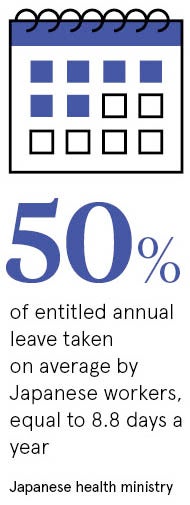We have Japan to thank for the practice of conspicuous overtime. From the 1950s onwards, post-war Japan set a benchmark for hard work the world over. In its golden age of growth, Japan’s corporations offered lifelong job security and high wages in return for long working hours, loyalty and service. A job for life as a regular worker at a respected firm demanded personal sacrifice – unpaid overtime and relocations – but it was a price that was accepted freely.
Since the 1997 Asian financial crisis, however, Japan’s productivity has languished at the bottom of the G7 league table, well beneath the Organisation for Economic Co-operation and Development (OECD) average. Productivity in the services sector, which employs almost 70 per cent of workers, fell by more than 10 per cent between 2003 and 2016, according to Bloomberg Economics.
Convenience stores sell clean shirts for those who haven’t had a chance to go home
Japanese workplace conventions which were once a boon to productivity have begun to have a perverse effect. Working overtime has become a proxy for working efficiently and a whole culture has evolved around enabling absurdly long hours. It is considered impolite to leave the office before your boss and workers are hesitant to do so before their peers. Convenience stores sell clean shirts for those who haven’t had a chance to go home and a genre of literature, kodoku, romanticises the loneliness of Japanese workers who have little time or inclination to see friends or find a partner.
Japan’s working culture has become life-threatening
Death by overwork, karoshi, claimed 191 people in 2016 and, according to a government report over a fifth of Japanese employees are at risk through working more than 80 hours of overtime a month, usually unpaid. More serious still, one in ten Japanese workers clock over 100 hours of overtime each month.
And on average, Japanese workers use just 50 per cent of their entitled annual leave, amounting to just 8.8 days a year, according to the health ministry, a percentage far less than that of Japan’s highly productive neighbours Hong Kong (100 per cent) and Singapore (78 per cent).
The government is well aware of the depth of the crisis. Japan’s parliament is debating a bill which would cap monthly overtime at 100 hours, and has begun to name, shame and fine workplaces that violate existing rules. But campaigners argue that without addressing the amount of work employees shoulder, any cap would force Japanese workers to complete their workload through clandestine means earlier in the morning, through lunch and at home.
Japan suffering from low productivity and birth rates
As Japan grapples with its productivity shortcomings, it also faces a well-documented and connected demographic crisis. Deaths in Japan now outnumber births at a rate of 1,000 a day. Yoshie Komuro, founder and chief executive of consultancy Work-Life Balance, says Japan’s punishing work culture is directly related to the falling national birth rate.
Meaningful provisions to encourage and support young people to start families are severely lacking, as workplaces seem indifferent to helping Japanese employees balance work with their personal life.
As part of prime minister Shinzo Abe’s so-called “Abenomics” programme to boost the economy, women have been encouraged to stay in or rejoin the workforce; some 70 per cent leave after their first child. Yet unofficial and illegal workplace policies such as pregnancy order systems, which employers use to make couples wait in turn to have children, persist and are lowering Japan’s birth rate, says Kanako Amano, a researcher at the NLI Research Institute.

A rise in precarious employment may also be creating a class of Japanese men who don’t marry. Men are still widely expected to be breadwinners in Japan and yet a rise in irregular work, which has grown by 7.6 million jobs between 1995 and 2008, just as jobs for life have fallen by 3.8 million, is limiting their chances. Irregular work is paid approximately 30 per cent less than other jobs and while 56 per cent of full-time corporate employees in their early-30s are married, just 30 per cent of irregular workers are, according to Professor Jeff Kingston of Temple University.
Simple steps must be taken to address Japan’s work culture
Japan’s high expectations of its economy may be frustrating workplace reform. The country has an exacting service culture to uphold, yet a national fear of inflation, price rises and job cuts. Coupled with its falling birth rate and closed-door immigration policy, the pressures heaped upon those in work are great. As real wages have stagnated, employees have been even less inclined to complain about extra working hours or hop between jobs, prioritising work well ahead of their personal lives and health.
The country could make efficiency gains through relatively modest changes. The culture of work in Japan is needlessly hierarchical, decision-making is slow and consensual, flexible working is rare and suffocating rules penalise staff for the most trivial of infractions. Rooting out obtuse work practices, such as micro-management, presenteeism, superfluous meetings and paperwork, and the practice of awarding pay rises for seniority rather than performance could enable great gains.
On a macro-economic level, Japan is beginning to admit more foreign workers and automation may also boost productivity. On a company level, those able to make modest workplace reforms, even if they cannot offer a job for life, may find it easier to poach talent, says Yumiko Murakami of the OECD.
Japan's working culture has become life-threatening
Japan suffering from low productivity and birth rates

